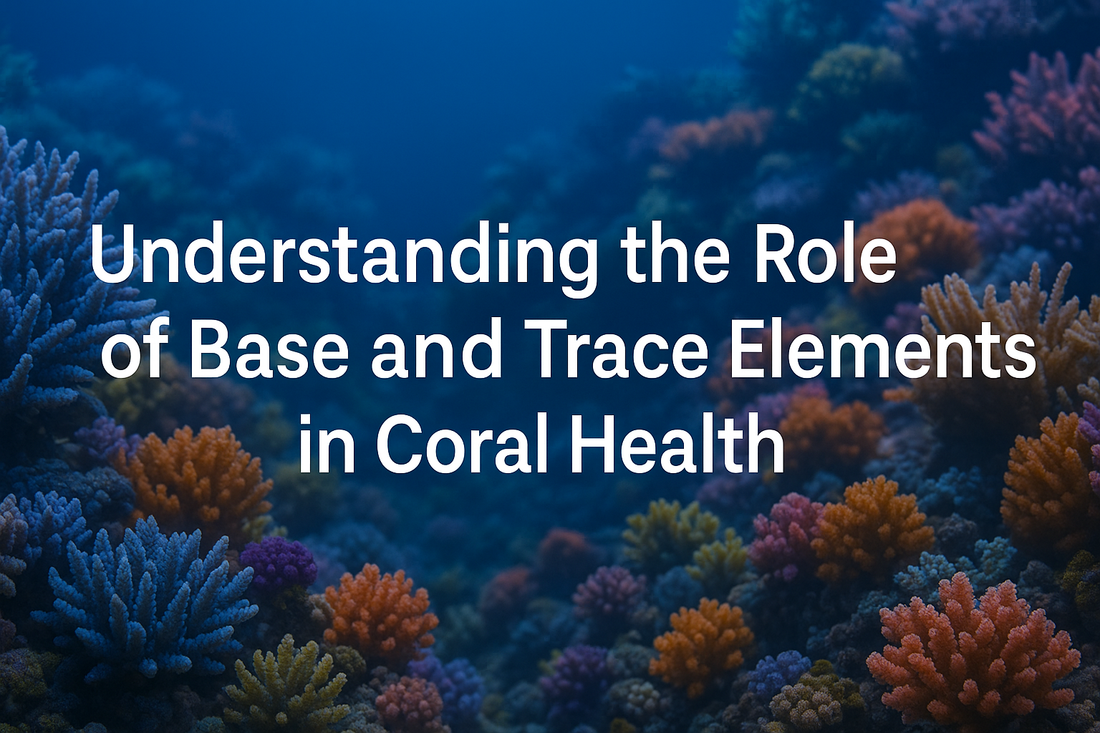Creating and sustaining a thriving reef aquarium is both a science and an art. While lighting, flow, and biological balance are essential, none of it works without a chemically stable environment. At the heart of reef chemistry are base elements and trace elements—two categories that are often misunderstood but critically important for coral health.
In this guide, we’ll explain the differences between base and trace elements, how they affect coral growth, coloration, and vitality, and why maintaining their balance is key to long-term reef success. Whether you’re dosing manually or using advanced products like Reef Zlements Complete Dosing, understanding these elements will help you make better, more informed decisions.
What Are Base Elements?
Base elements—also known as macroelements—are the major chemical components required in large quantities for the biological and skeletal development of corals and reef organisms. The three most essential base elements in reef tanks are:
1. Calcium (Ca)
Calcium is the foundation of coral skeletons. It combines with carbonate ions to form aragonite, the mineral structure of coral growth. Without enough calcium, SPS and LPS corals will stop growing, and stony structures may weaken or dissolve.
2. Alkalinity (Carbonate Hardness, KH or dKH)
Alkalinity measures your system’s buffering capacity. It stabilizes pH and provides the carbonate ions needed for calcification. Low alkalinity can result in pH instability and stressed coral tissue, while high levels may cause precipitation and interfere with ion balance.
3. Magnesium (Mg)
Magnesium helps maintain calcium and alkalinity in solution. It prevents premature precipitation and plays a supporting role in enzyme activation and coral metabolism. A well-balanced magnesium level ensures a stable and usable calcium-alkalinity ratio.
What Are Trace Elements?
Trace elements are required in very small quantities (parts per billion or million) but play massive roles in coral physiology, coloration, and immune health. These include:
Iron (Fe)
Essential for photosynthesis in zooxanthellae—the symbiotic algae living in coral tissue. A lack of iron can result in pale coloration and reduced growth.
Iodine (I)
Supports coral coloration, cellular health, and acts as an antioxidant. Iodine is especially important in soft corals and SPS species.
Strontium (Sr)
Plays a role in coral skeletal development, working alongside calcium. It’s particularly important for LPS and SPS corals.
Potassium (K)
Involved in pigment expression and nervous system function in reef organisms. Potassium enhances blues and purplesin many coral species.
Manganese, Zinc, Boron, Vanadium, Nickel
These and other trace elements are involved in various enzyme reactions, detoxification pathways, and metabolic functions. While needed in minute quantities, imbalances can have visible and systemic effects.
Why Balance Matters
Corals are sensitive creatures. The difference between growth and recession can come down to subtle shifts in elemental concentrations. Too little iodine and your colors fade. Too much zinc and your corals retract. Even if calcium and alkalinity are in check, you can still experience:
-
Slow or halted coral growth
-
Pale, faded, or browned-out colors
-
Reduced polyp extension
-
Weak skeletal structure
-
Poor recovery from stress
Balancing both base and trace elements ensures your corals have all the building blocks they need, not just for survival—but for thriving coloration, expansion, and reproduction.
How Do I Maintain Proper Element Levels?
1. Test Regularly
Use hobby-grade kits for alkalinity, calcium, and magnesium on a weekly basis. For trace elements, schedule monthly ICP-OES tests, such as those from Reef Zlements, which provide a full elemental breakdown and dosing guidance.
2. Use a Balanced Dosing System
Instead of dosing elements separately and risking imbalance, use an integrated system like Reef Zlements Complete Dosing. It provides:
-
Z-Complete 1 (Alkalinity)
-
Z-Complete 2 (Calcium)
-
Z-Complete 3 (Magnesium)
-
Z-Trace (for micronutrient dosing)
These products are formulated to maintain NSW (Natural Seawater) levels and can be fine-tuned using your ICP test results.
3. Monitor Coral Behavior
Coloration, polyp extension, and growth tips are signs of how well your chemistry is supporting coral vitality. If corals start to fade or recede, check your parameters and trace levels before making changes.
Common Misconceptions
-
“If I just maintain Ca/Alk/Mg, I’m fine.”
Not entirely. Base elements support structure, but trace elements support life. Both are needed for a healthy, colorful reef.
-
“More is better.”
Overdosing trace elements can be just as harmful as deficiencies. Always follow recommended doses and adjust based on test results.
-
“I don’t need ICP testing.”
Hobby kits are limited. If you’re keeping SPS or investing in high-value livestock, ICP testing is essential for spotting imbalances you can’t see.
Final Thoughts: Fuel Your Reef with Complete Chemistry
Understanding and maintaining the right levels of base and trace elements is the backbone of modern reef-keeping. These elements work in synergy to support coral growth, immune response, pigmentation, and skeletal formation. Skipping either category puts your reef at risk of underperformance—or worse, system crashes.
With solutions like Reef Zlements Complete Dosing and regular ICP analysis, achieving perfect balance has never been more accessible. You don’t need to be a marine chemist—just an aquarist willing to learn and apply data-driven reef care.
Ready to balance your reef for health and color?
Explore the Reef Zlements Complete Dosing collection and bring scientific stability to your coral care—only at Charterhouse Aquatics.


